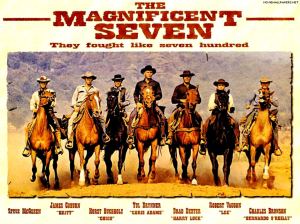
This was a difficult watch, just like I know this is going to be a difficult review, because "The Magnificent Seven" is so incredibly close to "Seven Samurai" that it sometimes comes across as if the American version is ripping off the Japanese film, when I shouldn't be comparing the two and look at "The Magnificent Seven" on its own merits.
In a way, I'm glad I have watched "Seven Samurai" four or five times in my life before watching "The Magnificent Seven" for the first time. If I had only watched Kurosawa's samurai masterpiece once or twice, most of the similarities and respectful tributes would go over my head. If I had never seen "Seven Samurai" before this, the comparisons would be lost on me. But now I know almost every major plot point in "Seven Samurai" and can point to every key scene for its significance and how each scene is like a beautiful sand-swept painting by Kurosawa, without ever getting tiresome.
The story of "The Magnificent Seven" follows a small Mexican town being constantly attacked and pillaged by Calvera (Eli Wallach) and his bandits. The townspeople decide they will not stand for this crimes anymore and that they must protect themselves by hiring bodyguards. As some of the townsfolk head across the border to a nearby town, they come across Chris Adams (Yul Brynner), who is more than willing to protect the village. Chris eventually gets assistance from six other cowboys, including Vin Tanner (Steve McQueen), Britt (James Coburn) and Bernando O'Reilly (Charles Bronson).
While the comparisons to "Seven Samurai" are unavoidable, I think that's what "The Magnificent Seven" was going for. Keep in mind this came out in 1960, when you couldn't see "Seven Samurai" unless you had an indie or foreign movie theater or lived in Japan. But American film studios loved "Seven Samurai" and wanted to share its story of a gang of misfits protecting a village for no reward with the rest of the world, and found this was the best way to share that experience.
There are many scenes in "The Magnificent Seven" that are direct copies from "Seven Samurai," including the introduction of Charles Bronson and James Coburn's characters, while also giving us a slightly different interpretation of Yul Brynner's introduction, while still laying the ground work of how calm and calculating his character is, much like Takashi Shimura's leader.
Strangely enough, the runtime for "The Magnificent Seven" is about half the length of "Seven Samurai," yet it still feels like every major scene in the Japanese film is covered here, including the rouge and hot-blooded character giving his grand speech about how cowboys/samurai's make peasants want to take up weapons just to defend themselves.
But the biggest improvement "The Magnificent Seven" has is its villains. "Seven Samurai"'s bandits got the job done, but they were the most basic and undefined villains you can think of - they steal, kill and burn down villages, that's about it. But now we get a grandiose performance from Eli Wallach, who played Tuco in "The Good, The Bad and the Ugly," who loves to drone on about how much he loves his lifestyle and believes he is being grateful to the villagers. He is so full of himself that you love seeing his grin that shows off is silver tooth, and you want to see these cowboys gun him down for being the biggest bastard around.
Overall, "The Magnificent Seven" is a wonderful homage to an even better movie. I keep going back and forth on whether I should compare this movie to "Seven Samurai" or let it stand on its own, but I think as both an adaptation and a captivating western. It brings a foreign product to American audiences in a way we can understand it, while still giving us the best parts of "Seven Samurai." Yet the film still stands on its own, powered by many great performances from Steve McQueen, James Coburn and Eli Wallach.
Final Grade: A-

No comments:
Post a Comment